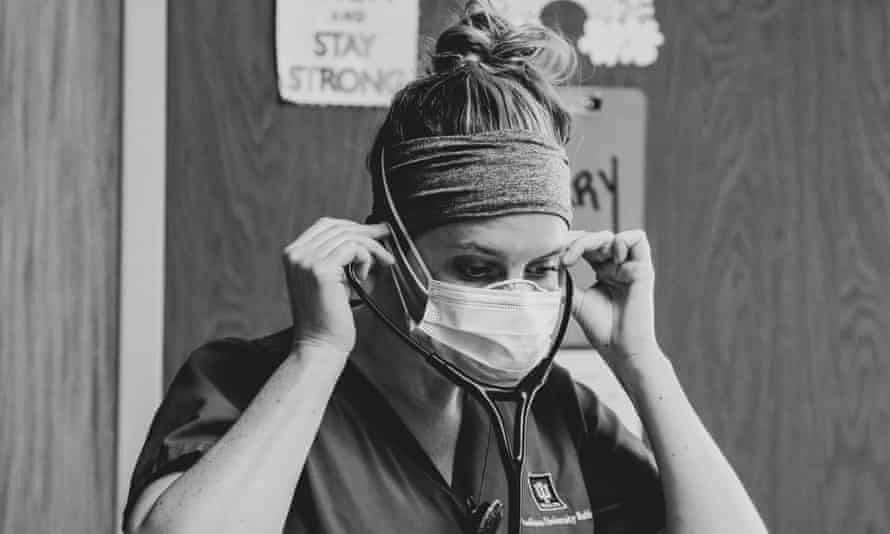‘It’s a war zone’: healthcare workers show signs of stress similar to combat
Almost two years after working in a temporary Covid intensive care unit at the hospital of the University of Pennsylvania, Kim Bishop, a critical care nurse, can still remember which patients were in which rooms.
“When you walk back on these units, you know which patient survived in which room and which ones didn’t,” said Bishop, who still works at the Philadelphia hospital and moves among different units. “I thought we closed that chapter once we closed that unit, but now walking back into it, it’s almost like a slap in the face.”
Bishop’s feelings are not unique among providers who treat Covid patients in the US. Many are leaving the field.
Recent research indicates that healthcare workers and first responders are displaying post-traumatic stress disorder symptoms like veterans who served in combat.
Healthcare providers and researchers now say that if hospitals continue to be overwhelmed with patients who have not been vaccinated against the virus and administrators don’t find a way to provide relief to medical staff, many will leave areas where they care for Covid patients – or exit healthcare altogether. That would worsen staffing shortages and further strain hospitals’ capacity to provide necessary care.
“It’s important to take care of and think of healthcare workers because they matter as people, and also it has really significant implications for our healthcare system,” said Dr Rebecca Hendrickson, a VA Puget Sound Health Care System clinical psychiatrist and lead researcher of a new study on healthcare workers. “You actually can’t protect your healthcare system without protecting the workers.”
The Journal of General Internal Medicine study published in December surveyed more than 500 doctors, nurses and first responders and found that 15% said it was “not at all likely” they would still work in the field in five to 10 years. Among nurses, the figure was 20%.
That’s largely because of the deterioration of healthcare providers’ mental health. Seventy-four per cent of respondents reported symptoms of depression; 37% reported symptoms of post-traumatic stress disorder; and 15% reported thoughts of suicide or self-harm.

A significant contributor to their recent distress, Hendrickson said, was the duration of the pandemic. Earlier in the pandemic, workers knew they were facing a real risk of becoming ill but understood there was no other option to provide care to patients. Vaccines were not yet available, and there was a limited quantity of personal protective equipment.
Now, more than two-thirds of hospital workers are vaccinated, according to a September report in the American Journal of Infection Control, but they treat Covid patients who in most cases are severely ill because they have not been vaccinated. Hospitals also still sometimes ask nurses to use less personal protective equipment than they feel they need because of the cost or patients’ complaints, respondents said.
“Even when objectively the risk level may be lower” because they are vaccinated and the Omicron variant is less severe than earlier variants, “when they were asked to take risk that no longer felt necessary, that was actually harder to handle and caused more distress”, Hendrickson said.
Every day that Kadee Klafka works as a cardiac intensive care nurse at Ball Memorial hospital in Muncie, Indiana, she speaks with the families of Covid patients on ventilators, almost all of whom have not been vaccinated, she said. She often must inform them that their loved ones’ lungs won’t recover.
“We have done every single thing we can,” she tells them. “Right now, they are just suffering, and the best thing we can do for them is make them comfortable.”
Klafka wishes she could wear a GoPro camera to illuminate nurses and patients’ experience.
“I have had to learn to cope with the anger that continues to rise and fall based on people who will not get vaccinated,” she said.
Patients are often angry too because of how long they wait in the emergency room before they can get a bed, Bishop, the Philadelphia nurse, said. In 2021, 71% of medical practices saw an increase in the number of incidents with disruptive patients, according to a January poll from the Medical Group Management Association, which represents large physician groups.
Bishop is also drained by two years of worrying about infecting her family, she said. She said the Omicron surge is even harder to manage than previous waves.
“I felt like there was a light at the end of the tunnel, especially with the vaccine. I felt like we were getting back to normal, being able to go…
Read More: ‘It’s a war zone’: healthcare workers show signs of stress similar to combat

